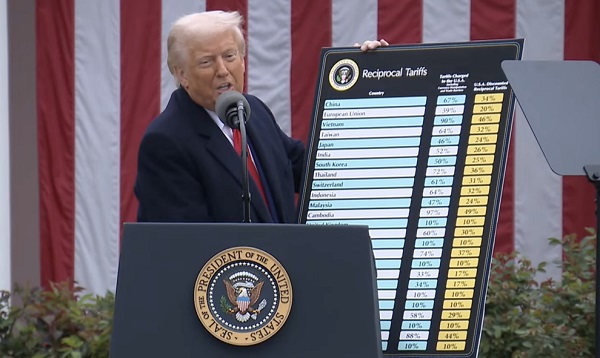International
‘Died A Hero’: Former Volunteer Fire Chief Identified By Family As Crowd Member Killed At Trump Rally

 From the Daily Caller News Foundation
From the Daily Caller News Foundation
By HAILEY GOMEZ
A crowd member killed on Saturday evening at former President Donald Trump’s Pennsylvania rally is reported to be 50-year-old Corey Comperatore, according to family members on Facebook.
While attending Trump’s rally in Butler, Pennsylvania, Comperatore was fatally shot by 20-year-old Thomas Matthew Crooks, saving his two daughters in the process by diving onto them to shield the two from gunfire. Comperatore’s sister, wife and daughters posted tributes to the former volunteer fire chief of Buffalo Township on social media.
“The PA Trump Rally claimed the life of my brother, Corey Comperatore. The hatred for one man took the life of the one man we loved the most,” Dawn Comperatore Schafer, Corey Comperatore’s sister, wrote on Facebook.
“He was a hero that shielded his daughters. His wife and girls just lived through the unthinkable and unimaginable,” she continued. “My baby brother just turned 50 and had so much life left to experience. Hatred has no limits and love has no bounds. Pray for my sister-in-law, nieces, my mother, sister, me and his nieces and nephews as this feels like a terrible nightmare but we know it is our painful reality.”

Dawn Comperatore Schafer Facebook Post of Corey’s death. (Screenshot/Facebook)

Helena facebook post (Screenshot/Facebook)

Kaylee Comperatore Facebook Post Of Father (Screenshot/Facebook)

Allyson Comperatore Facebook Post of Father (Screenshot/Facebook)
Democratic Pennsylvania Gov. Josh Shapiro held a press conference Sunday afternoon confirming Comperatore’s identity and stating he has spoken with the former fire chief’s family.
“Corey was a girl dad. Corey loved his community. Most especially Corey loved his family. Corey was an avid supporter of the former president and was so excited to be there last night with him in the community,” Shapiro said. “She [Corey’s wife] also asked that I share with all of you that Corey died a hero. That Corey dove on his family to protect them last night at this rally.”
Shapiro continued to condemn the violence that broke out stating how there can be political disagreements, but “we need to use a peaceful political process to settle those differences.”
“This is a moment where all leaders have a responsibility to speak and act with moral clarity. Where all leaders need to take down the temperature and rise above the hateful rhetoric that exists in search for a better, brighter future for this nation.”
WATCH:
NEW: Pennsylvania Gov. Josh Shapiro shares new details about spectator killed during Trump rally. pic.twitter.com/39jQ2LQyLj
— MSNBC (@MSNBC) July 14, 2024
Gunshots broke out at the rally shortly after Trump began to speak around 6 p.m. local time. Video footage captured the loud pop ringing through the crowd before Trump could be seen lifting his hand to his right ear before Secret Service members flooded the stage.
Members within the crowd could be heard screaming right before guards prepared to take the former president off the stage, with some yelling out “shots” were fired. Shortly after the incident, an emergency doctor who was in the crowd at the time, told CBS News that he had rushed to help the victim suffering.
“The guy had spun around, was jammed between the benches, he had a head shot … there was lots of blood and he had brain matter there,” the doctor said, adding that he did chest compressions and performed CPR.
In addition to Comperatore, two other crowd members were critically injured, however, it is unclear what their conditions are.
International
FREE MARINE LE PEN!’: Trump defends French populist against ‘lawfare’ charges

From LifeSiteNews
‘The Witch Hunt against Marine Le Pen is another example of European Leftists using Lawfare to silence Free Speech, and censor their Political Opponent,’ Donald Trump on Truth Social.
U.S. President Donald Trump defended French populist Marine Le Pen as a fellow victim of “lawfare” after the popular opposition leader was barred from the 2027 French national election due to embezzlement charges.
“The Witch Hunt against Marine Le Pen is another example of European Leftists using Lawfare to silence Free Speech, and censor their Political Opponent, this time going so far as to put that Opponent in prison,” Trump wrote Thursday night on Truth Social.
As of Sunday, Le Pen, head of the National Rally (RN) party, was leading polls to win the presidential election, being 11 to 17 points ahead of the party of the globalist President Emmanuel Macron.
On Monday, Le Pen was hit with a five-year ban on running for elected office and sentenced to four years of prison on charges of “misuse of EU funds,” although two years were suspended and the remaining two would be served through house arrest.
Le Pen and her co-defendants were specifically accused of illegally using European Parliament funds for party employees who “seldom (or never) dealt with affairs in Brussels or Strasbourg,” of which the court held Le Pen personally responsible for €474,000.
Her prison sentence has been paused as her lawyer appeals the ruling, but the ban on her running for office nevertheless remains in force, despite the fact that legal penalties are typically delayed during the appeals process, according to Politico.
In his Truth Social post, Trump accused French leftists of using a “minor charge” against Le Pen as a pretext to block her from office.
“Just before what would be a Big Victory, they get her on a minor charge that she probably knew nothing about – Sounds like a ‘bookkeeping’ error to me,” wrote Trump.
“It is all so bad for France, and the Great French People, no matter what side they are on. FREE MARINE LE PEN!” he concluded.
Conservatives across Europe have rallied to Le Pen’s defense following Monday’s ruling, similarly slamming the decision as a pretext to exclude her from politics.
“I am Marine!” wrote Hungarian Prime Minister Viktor Orbán on X Monday, in a cry of solidarity with his fellow anti-globalist.
“This is nuts,” remarked former Greek finance minister Yanis Varoufakis on X. “Lawfare is wrong whomever it targets. And it is stupid to boot. France’s neofascists will only benefit from this, just as the MAGA lot did. A panicking illiberal establishment across the West is diving headlong into a totalitarian pit.”
“I am shocked by the incredible tough verdict against Marine Le Pen,” chimed in Geert Wilders, leader of a Dutch populist party that won a national election in 2023. “I support and believe in her for the full 100% and I trust she will win the appeal and become President of France.”
Russian President Vladimir Putin’s spokesperson Dmitry Peskov has called the ruling a “violation of democratic norms,” and Reform UK party leader Nigel Farage denounced Le Pen’s “cancellation” as based on “a very trumped-up charge.”
“In this country we have nine county council elections on 1 May that won’t happen, and may not happen for years,” said Farage, according to the BBC. “And in France, they cancelled a candidate. A candidate that would, without doubt, have won the next French presidential election. And you know what, if looks to me like a very trumped-up charge.”
“They will not succeed in silencing the voice of the French people,” said Santiago Abascal, head of the pro-family, right-wing Vox party in Spain.
Italy’s Deputy Prime Minister Matteo Salvini urged Le Pen to keep fighting, calling her verdict a “bad film” akin to political shut-outs occuring in other countries like Romania.
“We will not be intimidated, we will not stop: full speed ahead my friend,” said Salvini.
Energy
Trump Takes More Action To Get Government Out Of LNG’s Way


From the Daily Caller News Foundation
By David Blackmon
The Trump administration moved this week to eliminate another Biden-era artificial roadblock to energy infrastructure development which is both unneeded and counterproductive to U.S. energy security.
In April 2023, Biden’s Department of Energy, under the hyper-politicized leadership of Secretary Jennifer Granholm, implemented a new policy requiring LNG projects to begin exports within seven years of receiving federal approval. Granholm somewhat hilariously claimed the policy was aimed at ensuring timely development and aligning with climate goals by preventing indefinite delays in energy projects that could impact emissions targets.
This claim was rendered incredibly specious just 8 months later, when Granholm aligned with then-President Joe Biden’s “pause” in permitting for new LNG projects due to absurd fears such exports might actually create higher emissions than coal-fired power plants. The draft study that served as the basis for the pause was thoroughly debunked within a few months, yet Granholm and the White House steadfastly maintained their ruse for a full year until Donald Trump took office on Jan. 20 and reversed Biden’s order.
Certainly, any company involved in the development of a major LNG export project wants to proceed to first cargoes as expeditiously as possible. After all, the sooner a project starts generating revenues, the more rapid the payout becomes, and the higher the returns on investments. That’s the whole goal of entering this high-growth industry. Just as obviously, unforeseen delays in the development process can lead to big cost overruns that are the bane of any major infrastructure project.
On the other hand, these are highly complex, capital-intensive projects that are subject to all sorts of delay factors. As developers experienced in recent years, disruptions in supply chains caused by factors related to the COVID-19 pandemic resulted in major delays and cost overruns in projects in every facet of the economy.
Developers in the LNG industry have argued that this arbitrary timeline was too restrictive, citing these and other factors that can extend beyond seven years. Trump, responding to these concerns and his campaign promises to bolster American energy dominance, moved swiftly to eliminate this requirement. On Tuesday, Reuters reported that the U.S. was set to rescind this policy, freeing LNG projects from the rigid timeline and potentially accelerating their completion.
This policy reversal could signal a broader approach to infrastructure under Trump. The Infrastructure Investment and Jobs Act, enacted in 2021, allocated $1.2 trillion to rebuild roads, bridges, broadband and other critical systems, with funds intended to be awarded over five years, though some projects naturally extend beyond that due to construction timelines. The seven-year LNG deadline was a specific energy-related constraint, but Trump’s administration has shown a willingness to pause or redirect Biden-era infrastructure funding more generally. For instance, Trump’s Jan.20 executive order, “Unleashing American Energy,” directed agencies to halt disbursements under the IIJA and IRA pending a 90-day review, raising questions about whether similar time-bound restrictions across infrastructure sectors might also be loosened or eliminated.
Critics argue that scrapping deadlines risks stalling projects indefinitely, undermining the urgency Biden sought to instill in modernizing U.S. infrastructure. Supporters argue that developers already have every profit-motivated incentive to proceed as rapidly as possible and see the elimination of this restriction as a pragmatic adjustment, allowing flexibility for states and private entities to navigate permitting, labor shortages and supply chain issues—challenges that have persisted into 2025.
For example, the $294 billion in unawarded IIJA funds, including $87.2 billion in competitive grants, now fall under Trump’s purview, and his more energy-focused administration could prioritize projects aligned with his energy and economic goals over Biden’s climate and DEI-focused initiatives.
Ultimately, Trump’s decision to end the seven-year LNG deadline exemplifies his intent to reshape infrastructure policy by prioritizing speed, flexibility and industry needs. Whether this extends formally to all U.S. infrastructure projects remains unclear, but seems likely given the Trump White House’s stated objectives and priorities.
This move also clearly aligns with the overall Trump philosophy of getting the government out of the way, allowing the markets to work and freeing the business community to restore American Energy Dominance in the most expeditious way possible.
David Blackmon is an energy writer and consultant based in Texas. He spent 40 years in the oil and gas business, where he specialized in public policy and communications.
-

 Business2 days ago
Business2 days agoB.C. Credit Downgrade Signals Deepening Fiscal Trouble
-

 Canadian Energy Centre2 days ago
Canadian Energy Centre2 days agoSaskatchewan Indigenous leaders urging need for access to natural gas
-

 COVID-191 day ago
COVID-191 day agoTrump’s new NIH head fires top Fauci allies and COVID shot promoters, including Fauci’s wife
-

 Business2 days ago
Business2 days agoTrump orders 10% baseline tariff on imports, closes de minimis loophole
-

 Freedom Convoy1 day ago
Freedom Convoy1 day agoFreedom Convoy leaders Tamara Lich, Chris Barber found guilty of mischief
-

 2025 Federal Election2 days ago
2025 Federal Election2 days agoHighly touted policies the Liberal government didn’t actually implement
-

 2025 Federal Election1 day ago
2025 Federal Election1 day agoWill Four More Years Of Liberals Prove The West’s Tipping Point?
-

 Business2 days ago
Business2 days agoCalifornia planning to double film tax credits amid industry decline





